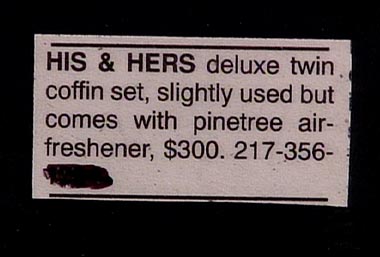no go on the truck borrow
 What a deal! This takes graverobbing to a whole new level...
What a deal! This takes graverobbing to a whole new level...Unfortunately my field assistant's father wanted payment for the use of his truck for a week, and to set that up through Ed's research account and with the university would have been something of a nightmare. Plus I got the distinct impression in talking to Ed that he wasn't going to happily fork over the cash for a trip that wouldn't actually get to my field area. Understandable. So we go first thing Monday.
My harddrives are full, again. I burned tons of stuff to dvds when I was back home, but I've acquired too much stuff since then. If you want a list of what I have send me an e-mail or catch me online, but I warn you - anything you request you likely won't receive until the fall when I've got some free time to burn and mail you stuff.
I'm listening to my new favourite song, Ritual by Meshuggah. They make excellent use of the root - minor second chords, which can be both hauntingly beautiful and forcefully heavy. I like using the minor second whenever I can, because with it the root note makes a major seventh, the root's minor third makes a major second, and the root's fifth makes a diminished fifth. Put another way, let's say we're in E minor (for guitarists' sake). Imagine the E minor chord: E, G, B (G-sharp would make it E major). If we then make a chord based on E's minor second (F natural); so with the F-C power chord in the base, then add the E chord on top, it can be made to sound fantastic. For best effect go F-C-G-E-B (base to treble). By adding the A we can give it a sense (minor/major). It would be best to add the A directly after the G thus: F-C-G-A-E-B.
Hah I wrote this as I'd play it on keys, guitarists like hoph will be annoyed. But it still has a nice resolution to E-B-E-G-F# (the E minor add nine chord). You could throw in a D# before the F# and you have something like the Bond chord (at the end of the theme).
Chords containing diminished fifths (also called the tritone) are my favourite. I've written whole songs based around the sound. It is complex and unresolved, can create a very eerie sense. The songs I've written are not particularly good, because they severely overuse the tritone, and it wears out the fascination. I am trying to incorporate the sound more subtly, but I find it difficult. Mostly because I enjoy the exercise of exploiting the tritone to the max.
I said way the hell back when I started this thing that I'd talk about music and my own interpretations of it. My way of understanding and contemplating chords is not exactly what they teach in musical theory, but it's close. The same chord structure (intervals between notes) creates the same effect in any key, hence actual note names are not necessary to write a whole song. It is entirely possible to write a song by only specifying the intervals involved. Although if the performer chooses a key too low or high the sound may be ruined. For instance my favourite chord:
Root, fifth, octave+major second, octave+major third, octave+major seventh, 2 octaves+diminished fifth (F-C-G-A-E-B above is this structure if you only go up from one note to the next). I do not have "perfect pitch", or the ability to know exactly what note is what when I hear them, or to be able to hum a "C" if asked to (I might get close). I work almost exclusively with intervals, when writing or hearing tunes.
Enough rambling about this. I'm done.
Cheers all.


1 Comments:
Though my understanding of music is not to your level, I usually picture it in the same way playing bass...its all about hand positions and the distances between notes...the intervals are always the same no matter where you place your fingers...its a good thing to, its easier that way...
8:58 AM, June 08, 2006
Post a Comment
<< Home